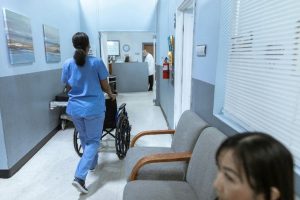Tunnetaitojen merkitys sosiaalisten taitojen pohjana, tasapainoisen elämän osana ja mielekkään elämän perustana on viime vuosina tunnustettu laajalti. Tunnetaidot mainitaan mm. Opetushallituksen laatimissa…
Tekijät | Authors

Shining the light on Advanced Practice Nursing (APN) – Why Advanced Practice Nursing is important
Advanced Practice Nursing (APN) refers to a level of nursing practice where highly skilled nurses take on expanded roles in clinical care. APNs manage complex health issues, support care continuity, and improve patient outcomes. Their advanced competencies in assessment, decision-making, and collaboration make them key players in efficient, person-centred care. Recognizing and developing APN roles is essential for modernizing healthcare and retaining nursing professionals.
Miriam Pelli and Henriikka Utriainen are studying Advanced Nursing Practice, a master’s degree programme at Turku University of Applied Sciences. This degree education strenghtens clinical expertise and development competence in nursing.
Students had a chance to participate in Nordic/Baltic Advanced Practice Nursing Educators Network conference Shining the light of advanced practice nursing organised in May 2024 in Mariehamn, Åland. The main topics of the conference were awareness and enhancement of the APN roles in health care and different perspectives on Why to invest on APN. The event was organised by the APN-EDU network (Nordic / Baltic Advanced Practice Nursing Educators) which has the aim to develop advanced practice nursing education in the Nordic and Baltic countries.
Considering the fact that there is a shortage of healthcare staff, it is needed to rethink the nursing workforce, health care processes and systems. In the modern world it is necessary to develop the systems and create new working models to make the practice of nursing more appealing and increase efficiency of health care services. It is a fact that the population is ageing and there will be more patients in the future. Therefore, simply increasing the workforce is not the only solution; changes in the delivery of healthcare are necessary to address and fix fragile gaps. Nursing education has improved, and nurses have increasing opportunities to continue professional development through studies. (WHO, 2015. 4.; ICN, 2020, 20.) When graduating as a registered nurse it is important to know there are options if desiring to have a clinical career continuum.
Challenges in healthcare can be addressed by nurses with enhanced or advanced skills – for as unclear clinical pathways of patients, problems getting treatment or continuum of the treatment, or insufficient collaboration between professionals. Studies indicate that well defined APN roles can also reduce healthcare costs. There is a need for advanced nursing to support modernization of health care services. Advanced practice should be seen as a level of practice more than just a role. (WHO, 2015. 14.)
Advanced practice nursing competencies and challenges
Advanced practice nurses provide direct and indirect patient holistic care on an advanced level. They can manage complex health care problems, and they have extended and broader range of autonomy in their practice. Their skills for assessment, judgement, decision-making and diagnostic reasoning are advanced. They provide support or consultant services to other health care professionals, and they have the ability to integrate research into practice. (ICN, 2020, 20.)

picture: Pexels.com
The main barriers identified include the impression that there are not enough knowledge and awareness about nurses in advanced roles and general lack of knowledge regarding the APN roles. Further regulations are important to clarify advanced nursing role and remove obstacles for APNs. Recognition and influence are essential in promoting the new APN roles. Increasing numbers of chronically ill people in Nordic and Baltic societies and ageing population is a challenge for existing health care system.
Not understanding the role has a negative impact also on patient acceptance of APNs. Patients experiencing improvement in their health increase the confidence n APNs skills and knowledge. Recent findings support introducing new APN roles improves patient engagement and cost effectiveness of care. There is a need to highlight the value and essence of advanced practice nursing by introducing and explaining APN roles in the health care context.
Care of the elderly now and in future prospects
It was delightful to hear about the studies and the results about advanced practice nursing. The themes were mostly about geriatric care and how to develop advanced geriatric nursing, especially home care. Erika Boman introduced the study on advanced geriatric nursing in primary health care in Scandinavia (Boman et al., 2019). This study focuses on advanced geriatric nursing in primary health care settings. Boman highlighted the challenges faced by elderly people’s access to primary health care and continuity of care. In the study they explore the potential roles of advanced geriatric nurse practitioners in bringing advanced competence closer to patients and serving as a link between different health services.
Dr. Boman et al. (2019) research identified the importance of advanced geriatric nurse practitioner competence levels, role clarification and scope of practice, not forgetting the need for organizational changes. The study included insights of interprofessional perspectives to introduce advanced geriatric nurse practitioners in primary health care, and how to create new models of delivering primary health care for elderly people and improving their health outcome.
Stories of successful APNs practices
MsN/APN, RN Anne Blankholm and MsN/APN, RN Katrine Munk Vernersen who are members of the APN nurse’s team employed in Aarhus Municipality in Denmark presented their work in practice. The APN nurses work exclusively with very complex and often multimorbid patients in home care, nursing homes and rehabilitation. They provided an overview by both collecting subjective data and an objective examination, developing a plan, and taking on a coordinating role with other health care professionals. The patient’s perspective is crucial in the holistic approach they aim for. Their experience shows society can save unnecessary resources with person-centered care.
Blankholm and Munk Vernesen pointed out the coordinating role is perhaps the most important as a patient can have contact with several health care professionals across sectors: hospital, home care, general practitioner, social services etc. Therefore, coordinating help for patients with complex issues is the most important role for APN nurses in solving physical, psychological and social issues to prevent patients fall in care gaps when moving between different health care sectors that have poor or no communication. A typical example is a patient discharged from hospital with no guarantee of follow-up. The APNs have an important role in creating an overview using the patient as a benchmark for the treatments to follow in deciding in a care and treatment plan. Some patients have social issues in addition to comorbidities to consider. Other patients need a rehabilitation plan focusing on functionality and recovery, and for some there is a need for multidisciplinary palliative end-of-life care.

kuva: Pexels.com
In Aarhus Municipality there is no doubt that APN nurses play an extremely valuable role in creating coherence and efficiency in local health care and in increasing patient safety. They provided examples of APN nurses successfully reducing hospital admissions, improving patient outcomes and ensuring continuity of care.
The integration of APN nurses has led to better resource utilization, improved patient safety, and higher quality of life for patients. APNs efforts help prevent unnecessary hospital admissions and ensure effective care management. Blankholm and Munk Vernesen pointed out how to create functioning models for advanced practice nurses and how to make it person-centered and cost-effective.
Advanced Practice Nursing: Transforming Healthcare
To enhance the quality of care it’s important to develop existing and new processes. In advanced level it is important to recognize the gaps inprocesses that are fragile and continuously develop different processes. With well functional processes it is possible to avoid clinical pathways that are fragile and increase patient satisfaction. Problems of getting treatment or continuity of treatment are necessary missions to be updated to today’s demands by advanced level nurses. APNs should be seen as makers of better patient outcomes and those keeping healthcare functional.
It is necessary to access care and treatment timely. Organizing the duties between nurses and physicians allows both groups to utilize their skills, and for example physicians to have more time on complex cases. It is important to enable nurses to practice to the full scope of their education on especially an advanced level. (Suutarila ym. 2023.) Developing effective physician consultation frameworks can help reduce healthcare costs. Thus, APN roles need to be well defined beforehand. By increasing the number of advanced practice nurses comprehensive and holistic care provision increases, potentially eliminating the need for patients to see a physician. It is necessary to have APNs in different settings to guarantee equal and integrated evidence-based practices. (Sairaanhoitajat, 2016, 20.)
PhD Susanne Søndergaard from Aarhus University, Denmark, presented the topic Advanced Practice Nursing as a Person –Tailored Practice in Danish Health Care exploring the role of advanced practice nurses (APNs) in Denmark. Dr. Søndergaard highlighted the importance of nursing practices meeting individual patient’s needs to improve patient satisfaction and health outcomes. Danish advanced practice nurse’s roles are heading towards more autonomous practices as initiating treatments, prescribing medications and referring patients to specialists.

kuva: Pexels.com
The challenges revealed were APNs role clarification and support from the health care system. Several study findings have also pointed out the opportunities for APNs to enhance the quality of health care by addressing the growing demands of change. Dr. Søndergaard suggests that integrating APNs into the healthcare system can lead to better continuity of care, and advanced practice nurses might reduce the workload of other healthcare professionals. According to Søndergaard’s research APNs can significantly contribute to the healthcare system by providing high-quality, easy access and effective care.
It is important to spread the word about APNs role
The additional value of the APN role brings flexibility and higher quality to health care. The APN role is seen as having more time for and a modern approach to person-centered care. Highlighting advanced practice nursing (APN) roles and education is a strategy to recruit and retain nurses by recognition and developing career pportunities. Implementing new care models with APN role clarification, including strong interprofessional collaboration and strong interprofessional communication, would influence and result in not only APN’s increased job satisfaction and work force stabilization but also significant lower health care costs.
Both Dr. Søndergaard and Dr. Boman research show APNs can significantly contribute to the healthcare system by providing high-quality, easy access and effective care. Aarhus Municipality in Denmark is an exemplar in how implementing APNs in the organization improve coordination across the healthcare system and increase patient safety and satisfaction.
APNs could deliver new aspects recognizing health promoting and people-centered care as an investment instead of a cost. Not only the famous extra pair of hands” can save health care – expertise is needed. The purpose of the APN Educators network is to share knowledge and best practices. That was just what the conference was about in Mariehamn.
Sources
Boman, E.; Glasberg, AL.; Levy-Malmberg, R. & Fagerström L. (2019). Thinking outside the box: advanced geriatric nursing in primary health care in Scandinavia. BMC Nurs. July 2;18:25. doi: 10.1186/s12912-019-0350-2
ICN (International council of Nurses), (2020). Guidelines On Advanced Practice Nursing. Viitattu 9.10.2024. https://www.icn.ch/system/files/documents/2020-04/ICN_APN%20Report_EN_WEB.pdf
Nordic / Baltic Advanced Practice Nursing Educators (2024). Viitattu 5.2.2025. https://nordicapnedu.turkuamk.fi/
Sairaanhoitajat, (2016). Sairaanhoitajien uudet työnkuvat – laatua tulevaisuuden sote-palveluihin. Sairaanhoitajaliiton APN-asiantuntijatyöryhmä. Viitattu 9.10.2024. https://sairaanhoitajat.fi/wp-content/uploads/2020/01/Laajavastuinen-sairaanhoitaja-muuttaa-sote-palveluita.pdf
Suutarla, A., Sulosaari, V., Heikkilä, J. (2023). The NP Role and Practice in Finland. In: Thomas, S.L., Rowles, J.S. (eds) Nurse Practitioners and Nurse Anesthetists: The Evolution of the Global Roles. Advanced Practice in Nursing. Springer, Cham. https://doi.org/10.1007/978-3-031-20762-4_13
WHO (World Health Organization), (2015). European strategic directions for strengthening nursing and midwifery towards Health 2020 goals. Viitattu 9.10.2024. https://iris.who.int/bitstream/handle/10665/353555/WHO-EURO-2015-5316-45080-64294-eng.pdf?sequence=1
OpenAI Microsoft Copilot was used for language correction and to assist in summarizing the content of this article.
This article is part of the work of research group CARE.









Hyvä juttu ,ja myös lähihoitajan työ myös huomioitu
Hyvin mielenkiintoista. Todella hyvä idea tämä APN. Se auttaa potilaita, varsinkin vanhuksia olemaan kotona ja saa tarvittavaa apua.